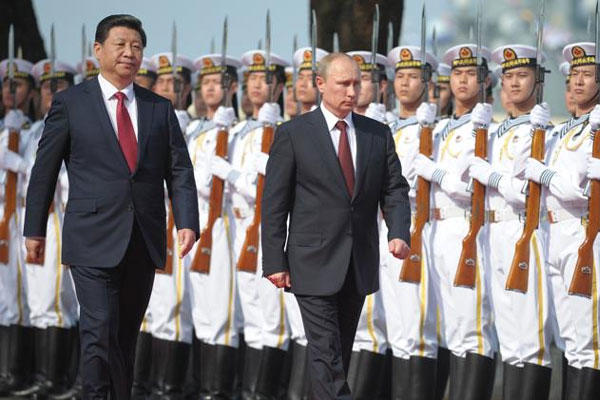Russian President Vladimir Putin arrived in Shanghai Tuesday to strengthen economic and military ties with China as the Pentagon sought to limit the fallout from the indictments of five Chinese army officers as cyber spies.
Putin met with President Xi Jinping on broadening trade between the two countries, including a major gas deal. Putin's visit also coincided with the start of joint Chinese and Russian naval exercises in the East China Sea.
In an interview with Chinese media, Putin called China "Russia's reliable friend."
"It would be no exaggeration if I said that the cooperation between our two countries is at its highest level in history," Putin said.
Putin said the two sides made "significant progress" on the sale of natural gas to China to ease Moscow's current dependence on sales to Europe that could be the target of Western sanctions over Russia's actions in Crimea and Ukraine.
Ships from Russia's Pacific fleet, including the guided missile cruiser Varyag, were taking part in the "Joint Sea-2014" exercise from May 20-26, the official Chinese news agency Xinhua said.
A total of 14 surface ships and two submarines were taking part in the exercises in the northern part of the East China Sea, Xinhua said.
"Both sides will use their best equipment in the joint drill, which indicates that our trust in each other is continuing to increase," said Cao Weidong of the Chinese Navy's Academic Research Institute, Xinhua reported.
The China-Russia naval exercises were taking place amid rising tensions between the U.S. and China over China's increasingly assertive claims to disputed islands in the South and East China Seas.
Vietnam, Japan, the Philippines, Korea and other neighboring states have counter-claims on the uninhabited islands and shoals, and were expecting support from the White House strategy of rebalancing U.S. forces to the Pacific.
The strengthening of ties between Russia and China also came as the U.S. military sought to preserve its own military-to-military relationship with China following the Justice Department's announcement of the indictments of five People's Liberation Army officers on charges of cyber espionage against U.S. firms.
China's official media rejected the charges. Under the headline "Big Brother USA's Spy Charges Are Absurd," Xinhua wrote that "everyone knows that the U.S. itself is the biggest cyber bully."
"We still believe it's important" to maintain and expand ties to the Chinese military, said Rear Adm. John Kirby, the Pentagon press secretary.
"This is a relationship that's important to us. It matters," Kirby said at a Pentagon briefing.
However, the indictments "represent activities that have to stop," Kirby said of the alleged hacking by the Chinese officers.
Despite the indictments, China was still invited to the annual Rim of the Pacific (RIMPAC) naval exercises off Hawaii late next month, Kirby said. China has agreed to participate in RIMPAC for the first time and was scheduled to send four ships to what is billed as the world's largest martime exercise.
-- Richard Sisk can be reached at richard.sisk@monster.com



























